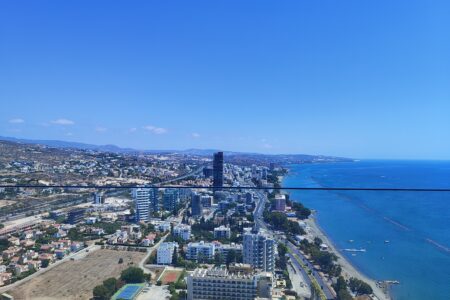Cyprus, located at the crossroads of Europe, Asia, and Africa, is increasingly gaining attention as an attractive place to live and work. As a member of the European Union, this island offers unique opportunities for immigration, particularly for those seeking to build a career abroad. A favorable climate, high standard of living, friendly local community, and advantageous tax legislation make Cyprus one of the preferred destinations for expatriates.
Immigration through employment is one of the most practical and popular ways to move to Cyprus. Thanks to its rapidly developing economy and growing demand for skilled professionals in industries such as finance, IT, and tourism, Cyprus is becoming an increasingly sought-after location for foreign workers. Many companies, including international corporations, actively seek talent from outside the island, offering competitive working conditions and career prospects.
However, the process of relocating and securing employment in Cyprus requires careful preparation and understanding of local laws and procedures. In this article, we will detail the steps necessary for a successful immigration to Cyprus through employment, from obtaining a visa to integrating into the local community.
Contents
Reasons to Choose Cyprus for Immigration
Geographic Location and Climate
Cyprus is located in the eastern part of the Mediterranean, making it a unique location in terms of climate and travel convenience. The island lies at the intersection of Europe, Asia, and Africa, making it strategically important and attractive for business. The wonderful Mediterranean climate, with over 300 sunny days a year, creates ideal living conditions. Warm winters and hot summers, along with the ability to enjoy the sea and nature year-round, make Cyprus especially appealing to those who value comfort and quality of life.
Economic Stability and Standard of Living
Cyprus has a stable and growing economy that offers numerous opportunities for professional growth. In recent years, the country has been recovering from the 2013 economic crisis, showing significant growth in sectors such as tourism, real estate, finance, and IT. Low taxes and favorable business conditions make Cyprus attractive not only for large companies but also for startups, opening up wide employment opportunities.
The standard of living in Cyprus is high, with access to quality healthcare and educational services. Although the cost of living is higher than in some other European countries, it remains affordable. This makes Cyprus attractive both for young professionals and families with children.
Cultural Features and Language Barrier
Cyprus has a rich cultural history. The local population is friendly and welcoming to foreigners, which facilitates quick adaptation. The official languages of Cyprus are Greek and Turkish; however, English is widely spoken, especially in the business environment and tourist areas. This significantly eases the integration process for expatriates who do not speak Greek.
Housing Availability and Infrastructure
Cyprus offers a wide range of housing options, from modern apartments in cities to traditional villas in the countryside. The real estate market is well-developed, allowing for a choice of housing that suits different income levels and personal preferences. Renting housing in Cyprus, although varying by region, is often more affordable than in major European capitals.
The island’s infrastructure is well-developed: modern roads, accessible public transportation, international airports, and an advanced healthcare and education network. All of this creates comfortable conditions for living and working.
Thus, the combination of a favorable climate, stable economy, cultural diversity, and accessible infrastructure makes Cyprus an ideal place for those considering immigration through employment.
Visas and Work Permits
An Overview of Visa Requirements for Employment in Cyprus
To work legally in Cyprus, foreign citizens must obtain the appropriate visa and work permit. Visa requirements and procedures depend on the country of origin, type of work, and level of qualification. Citizens of European Union countries have the right to free movement and employment in Cyprus without the need for a visa. For citizens of other countries, including those from the CIS, specific procedures must be followed to obtain a work visa.
Types of Work Visas for Migrants
There are several types of work visas in Cyprus, which may vary depending on the nature and duration of the employment.
Temporary Work Visas
Temporary work visas are intended for individuals who plan to work in Cyprus for a limited period. These visas are usually issued for up to one year with the possibility of renewal. They are often used by seasonal workers as well as employees on fixed-term contracts.
Work Visas for Highly Qualified Specialists (Yellow Slip)
For highly qualified specialists and those working in strategically important sectors such as IT, finance, and law, there is a special category of visas. The visa, known as the Yellow Slip, is issued to foreigners who have long-term contracts with Cypriot companies. It allows not only legal work but also residency in Cyprus with family members. The process of obtaining this visa is relatively straightforward if you have an invitation from an employer and proof of your qualifications.
Visa Application Process: Documents, Timelines, Costs
The process of obtaining a work visa in Cyprus requires careful preparation and includes several steps:
- Finding an Employer: The first step is to secure a job offer from a Cypriot company. The employer must confirm that the position could not be filled by a Cypriot or EU citizen and that you meet all the requirements for the job.
- Preparing Documents: This involves gathering the necessary documents such as your passport, employment contract, health insurance, proof of qualifications, and financial stability. You will also need to provide a criminal record certificate and medical tests.
- Submitting the Application: The application for a visa and work permit is submitted directly in Cyprus by your future employer.
- Waiting for a Decision: The processing time for the application can vary, but it usually takes from a few weeks to two months. It is important to note that the process may take longer depending on the complexity of the case and the workload of the immigration authorities.
- Receiving the Visa and Work Permit: After your application is approved, you will receive an entry visa, which will allow you to enter Cyprus for work. The residence permit will be processed after your arrival in Cyprus at the local Migration Department, where you will provide fingerprints and be photographed.
Understanding visa requirements and correctly preparing all documents are key steps for a successful immigration to Cyprus through employment. Employer companies often assist their employees in this process, which significantly eases the task of obtaining the necessary permits.
Employment in Cyprus
Labor Market in Cyprus: Key Sectors and In-Demand Professions
The economy of Cyprus is diverse, with key sectors actively hiring both local and foreign workers. The main industries offering a significant number of job opportunities include:
- Tourism: As one of the main sectors of the economy, tourism offers numerous job opportunities, especially in hotels, restaurants, and the service industry.
- Finance and Banking: Cyprus is known as an international financial center, and many international banks and financial companies have offices here. This creates demand for professionals in finance, accounting, auditing, and compliance.
- Information Technology and Communications (IT): The IT sector is rapidly developing, offering opportunities for programmers, data analysts, cybersecurity specialists, and other IT professionals.
- Real Estate and Construction: The development of real estate in Cyprus continues to attract investors, which creates demand for professionals in the fields of construction, architecture, real estate agents, and sales managers.
- Law and Consulting: Law firms and consulting companies are also actively hiring highly qualified specialists, particularly those with experience working with international clients.
How to Find a Job in Cyprus
There are several effective ways to find a job in Cyprus that can help expatriates enter the local labor market.
Using International and Local Recruitment Agencies
Recruitment agencies are one of the most effective ways to find employment in Cyprus. Many agencies specialize in placing foreign workers, helping them find suitable positions that match their qualifications and experience. Some agencies operate on an international level and can offer job opportunities even before you relocate to Cyprus.
Popular Job Search Websites
Using online platforms to search for jobs is another effective method. Among the popular job search websites in Cyprus are:
- CyprusJobs.com: One of the leading websites, featuring job postings across various sectors of the economy.
- EURES: The European Job Mobility Portal, which provides information on job vacancies in EU countries, including Cyprus.
- LinkedIn: A professional network that not only allows job searching but also helps in establishing connections with potential employers.
There are also specialized portals dedicated to specific sectors, such as IT or finance.
Leveraging Professional Networks (LinkedIn and Others)
Building professional connections through networks like LinkedIn can significantly increase your chances of finding employment. Actively participating in groups related to your field, engaging with recruiters, and joining discussions can lead to job offers. Additionally, many companies post job openings directly on their social media profiles, making them easily accessible to interested candidates.
The Employer’s Role in the Visa and Work Permit Process
The employer plays a key role in the process of obtaining a visa and work permit in Cyprus. The main responsibilities of the employer include:
- Document Preparation: The employer must provide the necessary documents proving that the position could not be filled by a local worker and that the candidate is suitable for the role. These documents include the employment contract, job description, and proof of the candidate’s qualifications.
- Visa Support: The employer often assists foreign employees in submitting the visa and work permit application by providing instructions, necessary forms, and liaising with immigration authorities.
- Providing Housing and Social Support: Some employers may offer accommodation or assistance in finding it, as well as support in adapting to the new environment, including health insurance and help with tax documentation.
Successfully securing a job in Cyprus requires an active approach from the candidate, utilizing various tools and platforms, and establishing connections with potential employers. The employer, in turn, plays a crucial role in legalizing your status in Cyprus and creating comfortable conditions for starting work on the island.
Working Conditions in Cyprus
Work Conditions and Employee Rights
Working conditions in Cyprus are regulated by both national legislation and collective agreements. The level of worker rights protection in Cyprus is quite high, making employment on the island attractive to foreign specialists.
Working Hours
In Cyprus, the standard workweek is 40 hours, typically spread over five working days from Monday to Friday. Some companies may offer a shortened workday on Friday or allow for a flexible working schedule. Depending on the industry, additional working hours may also be required, which are typically compensated as overtime.
Public Holidays and Vacation
In Cyprus, there are public holidays that are officially recognized as days off. Among the most significant are Easter, Christmas, New Year, and Cyprus Independence Day. In total, there are about 15 official public holidays in Cyprus each year.
As for annual paid leave, employees are generally entitled to a minimum of 20 working days of vacation per year (based on a five-day workweek). In some sectors, especially for employees with long service or in senior positions, the number of vacation days may be increased.
Salary Levels
Salaries in Cyprus vary depending on the industry, the employee’s qualifications, and experience. The average salary in Cyprus is around 1,800–2,000 euros per month. In industries such as finance, IT, and law, salaries can be significantly higher.
Healthcare and Social Security
Cyprus has a well-developed healthcare system that is accessible to both locals and foreign citizens. There are both public and private healthcare systems, allowing workers to choose the most suitable option.
Public Healthcare System
The public healthcare system in Cyprus is funded by taxes and social security contributions. Employees registered in the social security system are entitled to medical services at public institutions. Public hospitals and clinics offer a wide range of medical services, including primary and specialized medical care.
Private Healthcare System
Many foreign specialists prefer to use private healthcare services, which offer faster service and a broader selection of specialists. Private health insurance is often included in the benefits package provided by employers. Insurance typically covers most medical expenses, including doctor visits, hospitalization, and treatment.
Social Security
All officially employed individuals in Cyprus are required to participate in the social insurance system, which covers aspects such as pensions, unemployment benefits, sick leave, and maternity pay. Contributions to the social insurance system are shared between the employer and the employee. Social security in Cyprus provides a high level of protection for workers and their families, making labor migration to the island more attractive.
Working conditions in Cyprus are characterized by a high level of worker rights protection, attractive salaries, and relatively low tax rates. Healthcare and social security systems ensure stability and security for workers and their families.
These factors make Cyprus an appealing destination for labor migration, offering foreign specialists comfortable conditions for living and working on the island.
Potential Challenges and Risks
While migration to Cyprus for employment offers many advantages, it can also involve certain challenges and risks. Being aware of these potential issues can help you prepare for the move and avoid unpleasant situations.
Cultural Adaptation
Cyprus, although a European country, has a unique cultural heritage that blends elements of Greek and Turkish cultures. Foreigners may need time to adapt to local traditions, norms, and customs. For example, in Cyprus, family values are highly emphasized, and business relationships may be based on personal connections and trust. It’s also worth noting that Cypriots may conduct business at a slower pace than in some other countries, which might require some adaptation from foreigners.
Language Barrier
Although English is widely spoken in Cyprus, especially in business and tourism sectors, knowledge of Greek can significantly ease your integration into society and everyday life. The lack of language skills can create a communication barrier with the local population and make the adaptation process more difficult.
Climate Conditions
Although Cyprus is known for its pleasant climate, the hot summer months can be challenging for those unaccustomed to high temperatures. This may require lifestyle adjustments, especially if you plan to engage in outdoor activities or sports.
Legal and Administrative Risks
Difficulties with Documentation
The process of obtaining a work visa and permit can be complex and time-consuming. Incorrect documentation or errors in the application process can lead to delays or even visa denial. It is important to carefully follow all requirements and seek assistance from specialists or immigration consultants if necessary.
Changes in Legislation
Cyprus’s immigration laws, like those of any other country, can change. This may affect the conditions for obtaining visas, work permits, or even residence permits. Foreign workers should stay informed about current legislative changes and be prepared for possible shifts in their residency conditions on the island.
Labor Disputes and Employee Rights
Although labor laws in Cyprus protect workers’ rights, labor disputes or employer misconduct may still occur. It is important to be aware of your rights and responsibilities, as well as to have contact with local unions or legal advisors who can assist in case of conflicts.
How to Avoid Scams in Employment and Documentation
Careful Review of Job Offers
Before accepting a job offer, it is crucial to thoroughly vet the employer. It is strongly recommended to avoid offers from unknown or dubious companies and to pay close attention to contract terms that seem too good to be true. Using reputable recruitment agencies and job search platforms can significantly reduce the risk of fraud.
Verifying the Legitimacy of Documents and Intermediaries
When dealing with intermediaries or employment agencies, it is important to ensure their legitimacy and licensing. This also applies to obtaining visas and other legal documents. Collaborating with illegal or unscrupulous agents can lead to financial losses and issues with immigration authorities.
Monitoring Financial Transactions
When seeking employment abroad, especially through intermediaries, it is important to be cautious when transferring money and paying for services. Never send large sums of money without proper guarantees and contracts. If you are asked to transfer money to a personal account or to a country other than Cyprus, this could be a sign of fraud.
Emigration to Cyprus through employment offers numerous opportunities for professional and personal growth. This Mediterranean island attracts people with its favorable living conditions, stable economy, high standard of living, and availability of jobs in various sectors. Labor migration to Cyprus is becoming an increasingly popular choice among qualified professionals seeking new challenges and career prospects.
However, moving to Cyprus requires careful preparation and attention to detail. The process of obtaining a visa and work permit can be complex, and adapting to the new cultural environment and climate requires time and effort. Understanding the potential risks and challenges, such as legal issues and the dangers of fraud, is key to successful integration in Cyprus.
Nonetheless, taking the right approach to the emigration process, from selecting the right job to completing the necessary documentation, can make this transition smoother and more successful. It is important to utilize all available resources—from recruitment agencies and online platforms to professional networks and legal consultations—to simplify your transition to a new place of work and residence.
Cyprus, with its warm climate, friendly population, and opportunities for career growth, can be an ideal place for those seeking a balance between work and quality of life. With proper planning and a thoughtful approach, emigration to Cyprus through employment can become a successful and fulfilling life decision.
















